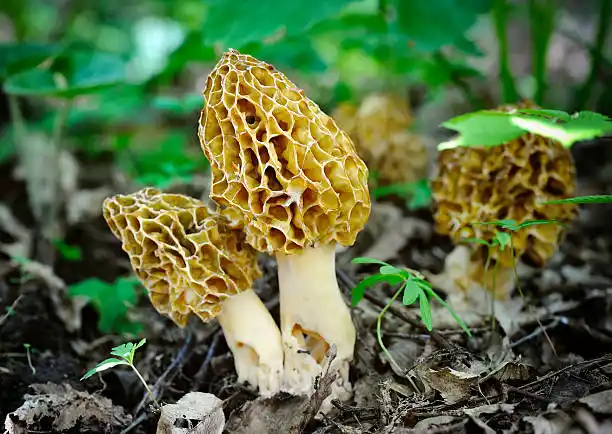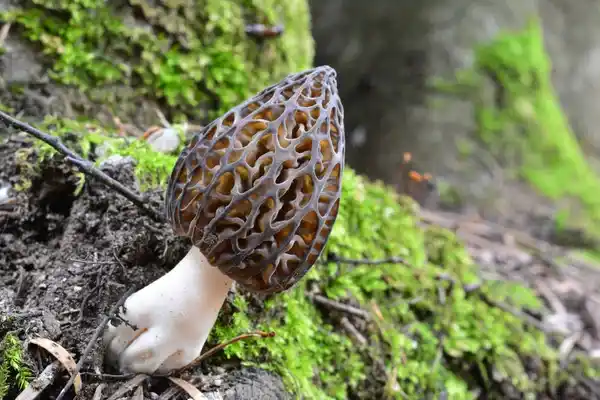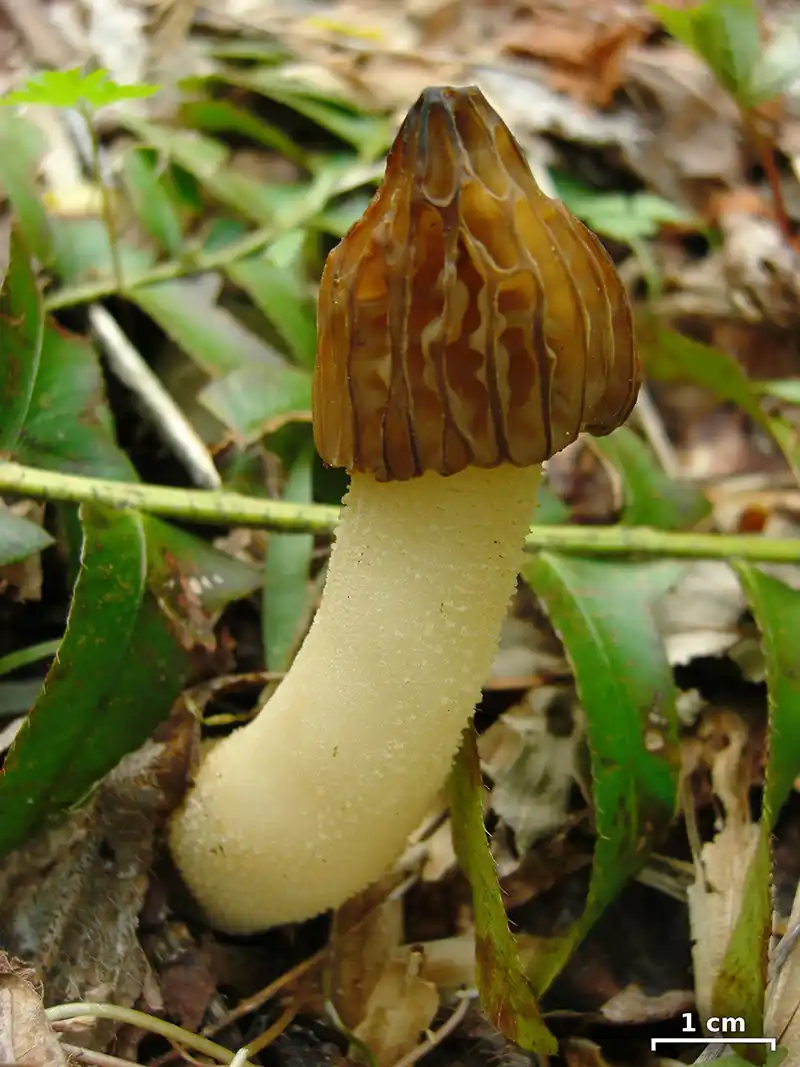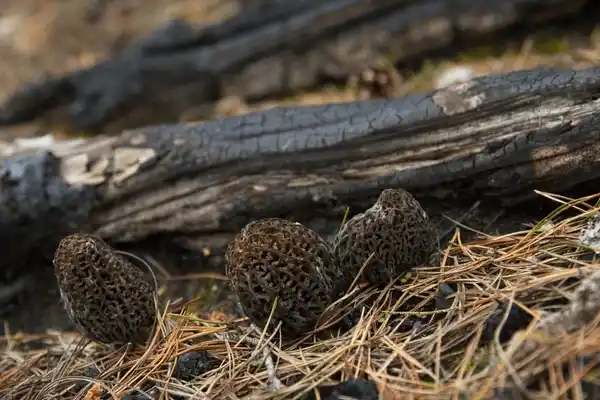Morel mushrooms are a prized delicacy among food enthusiasts and foragers. Known for their unique appearance, earthy flavor, and culinary versatility, these fungi have captured the interest of chefs and home cooks alike. Beyond their gastronomic appeal, morels also offer nutritional and health benefits. However, their safe collection and preparation require careful attention. Let’s delve into the fascinating world of morel mushrooms.

Types of Morel Mushrooms
Morels belong to the genus Morchella and come in various species, primarily distinguished by their color, shape, and habitat. Here are some common types:
1. Yellow Morels (Morchella esculenta)
These are the most popular variety, known for their honeycomb-like caps and tan to yellowish hues. They are typically found in hardwood forests during spring.
2. Black Morels (Morchella elata)
With darker caps and a slightly smoky flavor, black morels are often found in coniferous forests. They tend to grow in areas affected by wildfires.
3. Half-Free Morels (Morchella semilibera)
These have a distinct cap that is partially attached to the stem, giving them a “half-free” appearance. They are less common but still highly sought after.
4. Burn Morels (Morchella tomentosa)
These are found in areas of recent forest fires, thriving in nutrient-rich soil left behind by burned vegetation.
Each type has subtle flavor differences, but all share the characteristic nutty and earthy taste that makes them so beloved.

Nutritional and Health Benefits
Morel mushrooms are not only delicious but also packed with nutrients. Here’s what they offer:
Rich in Vitamins and Minerals
Morels are an excellent source of vitamin D, iron, and copper, all of which are essential for maintaining strong bones, healthy blood cells, and a robust immune system.
Low in Calories
With just 30 calories per 100 grams, morels are an ideal choice for those watching their weight while seeking nutrient-dense food.
Antioxidant Properties
Morels are rich in antioxidants, which help neutralize harmful free radicals in the body, potentially reducing the risk of chronic diseases.
Potential Immune Support
Some studies suggest that compounds found in morels may enhance immune system function and offer anti-inflammatory benefits.

Safe Foraging and Usage
While morels are a treat for the palate, they require careful handling to avoid potential risks. Here are some guidelines for safe foraging and consumption:
1. Identification
Always ensure that the mushrooms you collect are true morels. False morels, such as those from the genus Gyromitra, can be toxic and potentially fatal. Look for their distinct honeycomb-like cap and hollow interior.
2. Cooking is Essential
Raw morels contain a small amount of hydrazine toxins, which can cause stomach discomfort. Cooking morels thoroughly eliminates these toxins, making them safe to eat.
3. Cleaning and Storage
Rinse morels gently under cold water to remove dirt and insects. Avoid soaking them, as they absorb water like sponges. Store fresh morels in a paper bag in the refrigerator and consume them within a few days.
4. Cautious Foraging
When foraging, avoid areas with potential chemical contamination, such as near roadsides or industrial sites. Harvest morels responsibly to ensure sustainability.

Culinary Uses
Morels are incredibly versatile in the kitchen. Their earthy, nutty flavor complements a variety of dishes. Here are some popular ways to use them:
Sautéed
Sauté morels in butter with garlic and herbs for a simple yet flavorful side dish.
In Cream Sauces
Add morels to creamy pasta sauces or risottos for a luxurious meal.
Stuffed
Large morels can be stuffed with cheese, herbs, and breadcrumbs for an elegant appetizer.
Preserved
Drying morels is a popular method for long-term storage. Rehydrate them in warm water before use, and the soaking liquid can be used as a flavorful broth.

Final Thoughts
The world of morel mushrooms is indeed fascinating, offering a blend of culinary delight and nutritional benefits. While they require careful handling to ensure safety, the effort is well worth it for the rich flavors they bring to your table. Whether you forage them in the wild or buy them from a trusted source, morels are a true treasure of nature. Explore their potential in your next meal and enjoy the unique experience they offer.
News
JJ Redick reacts to Luka Doncic trade for Anthony Davis
In one of the most jaw-dropping moves of the season, the NBA landscape was rocked by the blockbuster trade involving Luka Dončić and Anthony Davis—a swap that has sent ripples of excitement, disbelief, and heated discussion through the league. Among…
Anthony Davis FULL reaction to trade to Mavericks for Luka Doncic
In a blockbuster move that sent shockwaves through the NBA and left fans reeling, Anthony Davis has been traded to the Dallas Mavericks in exchange for Luka Dončić. In the immediate aftermath of the news, Davis took to the media…
Shaq reacts to Dallas Mavericks wanting Kevin Durant after Luka-AD trade 
In the constantly shifting world of the NBA, trade rumors and blockbuster moves are a regular part of the season’s drama. The latest twist has fans buzzing: the Dallas Mavericks have reportedly set their sights on acquiring Kevin Durant in…
Donovan Mitchell FILTHY poster dunk on Kristaps Porzingis 
In a game filled with high-intensity moments and jaw-dropping highlights, one play in particular has left fans and analysts buzzing about Donovan Mitchell’s latest display of athleticism. Early in the contest, with the atmosphere already charged by an evenly matched…
Joel Embiid hits go-ahead bucket vs Mavs then chats with Anthony Davis after game
In one of the most thrilling contests of the season, Joel Embiid delivered a clutch performance against the Dallas Mavericks, punctuating the game with a go-ahead bucket that sent the home crowd into a frenzy. The atmosphere in the arena…
D’Angelo Russell game winner as Nets hit two 3’s in 3 seconds to win vs Rockets 
In one of the most electrifying moments in recent NBA history, D’Angelo Russell delivered an unforgettable game-winner that left fans and commentators in complete awe. With the Brooklyn Nets locked in a tense battle against the Houston Rockets, the outcome…
End of content
No more pages to load











